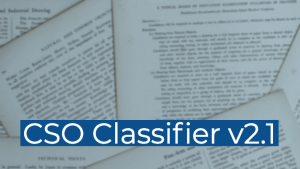
We are pleased to announce that we recently created a new
release of the CSO Classifier (v2.1), an application for automatically
classifying research papers according to the Computer Science Ontology (CSO).
Recently, we have been intensively working on improving its
scalability, removing all its bottlenecks and making sure it could be run on
large corpus. Specifically, in this version we created a cache version of the word2vec
model that allows us to directly connect the words within the model vocabulary with
the CSO topics. In this way, the classifier is able to quickly retrieve all CSO
topics that could be inferred by given tokens, speeding up the processing time.
In addition, since the cache weighs only ~64M, compared to the actual word2vec
model ~366MB, it allows to save additional time at loading time.
Thanks to this improvement the CSO Classifier is around 24x
faster and can be easily run on large corpus of scholarly data. At the moment,
the classifier is able to annotate 1 paper in around 1 second, which we
consider a great achievement since the very first prototype was requiring
around 20 seconds per paper.
About CSO Classifier
As showed in our resource
page, the CSO Classifier consists of two main components: (i) the syntactic
module and (ii) the semantic module. The syntactic module parses the input
documents and identifies CSO concepts that are explicitly referred in the
document. The semantic module uses part-of-speech tagging to identify promising
terms and then exploits word embeddings to infer semantically related topics.
The CSO Classifier then combines the results of these two modules and enhances
them by including relevant super-areas. More info about the CSO Classifier are
available in [1].
Download
The classifier is available through a Github repository: https://github.com/angelosalatino/cso-classifier,
but you can download the latest release (version v2.1) from:
Functionalities
The function running the classifier allows you to set two
parameters: (i) modules and (ii) enhancement. With the first parameter you to
decide which of the two modules to run. If you are looking for more precise
results and lower computational time (0.5 sec for paper) you can run only the
“syntactic” module. Instead, if you are looking for more comprehensive results
(with a slight impact on the precision) you can run “both” modules. With the
second parameters you control whether the classifier will try to infer, given a
topic (e.g., Linked Data), only the direct super-topics (e.g., Semantic Web) or
all its super-topics (e.g., Semantic Web, WWW, Computer Science). Using
“first” as value, it will infer only the direct super topics.
Instead, if using “all”, the classifier will infer all its
super-topics. Using “no” the classifier will not perform any
enhancement.
Other info, including how to run the classifier on a single
paper or in batch mode are available within the README file within the
repository/release.
References
[1] Salatino, A.A., Osborne, F., Thanapalasingam, T. and
Motta, E. 2018. The CSO Classifier: Ontology-Driven Detection of Research
Topics in Scholarly Articles. Available
in Pre-Print here


 Scholarly Knowledge Mining
Scholarly Knowledge Mining
 Digital Humanities
Digital Humanities
 Data Science
Data Science
 Smart Cities and Robotics
Smart Cities and Robotics